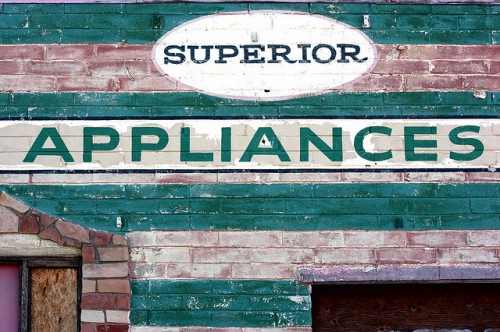
Anyway, when we got there we got a very friendly salesman who, for once, wasn’t super pushy. In making conversation we mentioned how old the fridge is and that led to a conversation about how old some of our other appliances are (they’re all the same age since they came new with the house). I told him how all these new bells and whistles on refrigerators just weren’t my thing (a TV in the fridge? Really?) and how I preferred to keep things simple. Jokingly I mentioned that we’d only gotten a flat screen TV this year when our tube TV finally died. The salesman then started talking about his recent search for a new car (to replace his “ancient” four year old car) and when I mentioned that my car is closing in on sixteen years old, he exclaimed, “Wow. You really are living in the dark ages!”
This isn’t the first time I’ve heard this or something similar to it. People seem to think it’s fun to make jokes about how old our cars are, or to comment on our lack of smart phones and tablets, or to joke about how close we are to being Luddites. (Really, we’re not that close.) We’re not living in the dark ages because we’re afraid of technology. Instead, we’re well aware that all of this technology comes with a hefty price tag.
Every time you buy/upgrade a car, computer, washer, cell phone, dryer or other appliance, that’s cash you don’t have for other things. Sure, sometimes you have no choice. Things break down and have to be replaced. But what I call “recreational replacement/acquisition” (which is buying when there’s not a real need, simply a desire for something newer) is costly. Unless you have a very high income, that’s the sort of behavior that will land you in financial trouble, eventually. Look at an example:
- I’ve kept my fridge for 18 years. I’ve banked money in my “emergency fund” for this moment all those years. I easily have the $1,200 to $1,800 to get the model that I want. I’ll pay that money once and hopefully not again for at least another ten years (I’d love it if I could go longer, but I’m not encouraged by the reviews I’m seeing. They don’t make ’em like they used to.)
- Had I upgraded it every five years, instead, I would have paid (let’s just say) $1,500 every five years. Over eighteen years, that’s $5,400. And that’s just one appliance. Do it for a whole kitchen and it’s a lot more money.
It’s the same with cell phones. Stick with one for five years and you’ve only paid (we’ll say that you pay on your own and it’s not part of your contract, etc.) $300. If you upgrade every six months, you’ve paid $3,000 over those five years. Even if you upgrade once per year that’s still $1,500. Computers, tablets, cars, video game systems and anything else that has an “upgrade appeal” can break you if you insist on always having something newer. This is especially true if you’re caught in the upgrade cycle for everything you own. The costs of keeping a “newer” car, phone, computer, appliance, and TV can quickly add up to scary amounts of money.
On the other hand, if you live in the dark ages like me and only replace something when it truly needs replacing (or when you buy something because you’ve identified a concrete need or benefit that it will add to your life), you will save a ton of money. My old car still runs very well. Working from home I use it lightly so it will probably last me many more years. My appliances do their job. My phone makes calls. As long as things do what I need them to do, I don’t feel a need to add lots of upgrades to them every time a new feature becomes available. Instead I choose to bank that money, invest it wisely, and spend it on things that give me much more value than a TV in my refrigerator.
(Photo courtesy of kevin dooley)

Jennifer Derrick is a freelance writer, novelist and children’s book author. When she’s not writing Jennifer enjoys running marathons, playing tennis, boardgames and reading pretty much everything she can get her hands on. You can learn more about Jennifer at: https://jenniferderrick.com/.






Comments